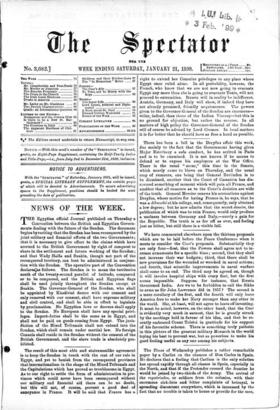We have commented elsewhere upon the thirteen proposals which are
to be laid before the Peace Conference when it meets to consider the Czar's proposals. Substantially they are only four—first, that the Powers shall agree not to in- crease armaments for a specific time ; second, that they shall not increase their war budgets ; third, that there shall be new provisions for the wounded or wrecked in naval actions; and fourth, that scientific improvements in naval warfare shall come to an end. The third may be agreed on, though it will involve hospital ships with every fleet, but the first
seems impossible. Suppose, for instance, that Russia threatened India. Are we to be forbidden to call the Sikhs to arms as Sir John Lawrence did in 1857 ? The second is a mere corollary of the first, and the fourth will only leave America free to make her Navy stronger than any other in the world. She, at least, will not agree to leave off inventing. It must be noted, however, on the other hand, that the Czar is evidently very much in earnest, that he is greatly struck by the meetings held in favour of his idea, and that he re- cently embraced Count Tolstoi in gratitude for his support of his favourite scheme. There is something truly pathetic in this picture of the greatest military Monarch in the world trying his best to prevent war, but as powerless to make his good feeling useful as any one among his subjects.


































